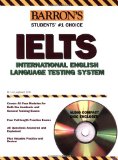Difference Between ESOL and IELTS
For many people who are seeking to pursue further studies from a university located in a different country, it is not just their transcript of records, and the ability to present substantial evidence that they will be able to fund their stay in that country – their ability, and level of speaking, reading and understanding the English language is also important. This is because English remains to be the language that is understood all over the world.
In order to provide a standardized gauging of a particular person’s ability to understand the command of the English language, without any bias, there are now a number of different examinations that a prospective student can take, for them to meet the requirements of the relevant university. Two of these examinations are the ESOL and IELTS. To learn more about these two examinations, please continue to read this article.
Both the IELTS and the ESOL examinations are taken by individuals who are considered to be non-native English speakers. By this, it means that English is not the first language, or national language, used in the person’s country of origin. These examinations are able to gauge a person’s ability to speak, read, listen and write, in English.
The IELTS utilizes only one set of examinations to test the individual’s overall command of the English language, covering all four areas for academic purposes. The results of this examination is released within two weeks, and is currently accepted by universities in the United Kingdom, Australia, New Zealand and United States, as part of the requirements to be submitted by international prospective students who want to apply for their university to further pursue their education. In some countries, the scores earned from the IELTS examination is among the requirements for those who are intending to migrate into another country. However, the results of these examinations are only valid for up to two years. After this time period, the individual will need to take the examination again.
On the other hand, the ESOL utilizes a number of different examinations to gauge a particular individual’s competence of the English language, depending on the requirements. Each of these examinations are specially tailored for a particular industry. For example, a teacher from a non-native English speaking country seeking employment in a native English speaking country, would be required to take the TKT, which is the ESOL examination that caters for teachers, instead of the ILEC, since this is the ESOL examination that is tailored for lawyers, paralegals and barristers. As such, ESOL examinations are usually taken by immigrants who are licensed, and specialized to practice within a particular field or industry. For this reason, the results of the ESOL examinations do not have any expiration. This means that a person can still use the ESOL certificate awarded to him in ten years time, and the certification will still be recognized.
Summary:
1. ESOL and IELTS are examinations taken by individuals from non-native English speaking countries, to show their ability in speaking, listening, reading and writing the English language.
2. The IELTS is commonly used by students who are applying to study in a university situated in the United Kingdom, Australia, New Zealand and United States. The ESOL is commonly used by individuals who are applying for a working visa in a native English-speaking country.
3. The results of the IELTS are only valid up to two years from the time that the exam was taken. The ESOL certificate does not have any expiration date.
- Difference Between Schizophrenia and Psychosis - March 7, 2024
- Difference Between African and Asian Elephants - March 7, 2024
- Difference Between Sunscreen and Sunblock - February 15, 2024
Search DifferenceBetween.net :
 Email This Post
: If you like this article or our site. Please spread the word. Share it with your friends/family.
Email This Post
: If you like this article or our site. Please spread the word. Share it with your friends/family.



What will be the best choice. Between iels or esl ??
What will be best between these two for study visa in canada ? Plz rpl
It is necessary to give ielts if esol have been passed ?
Update on esol age requirement